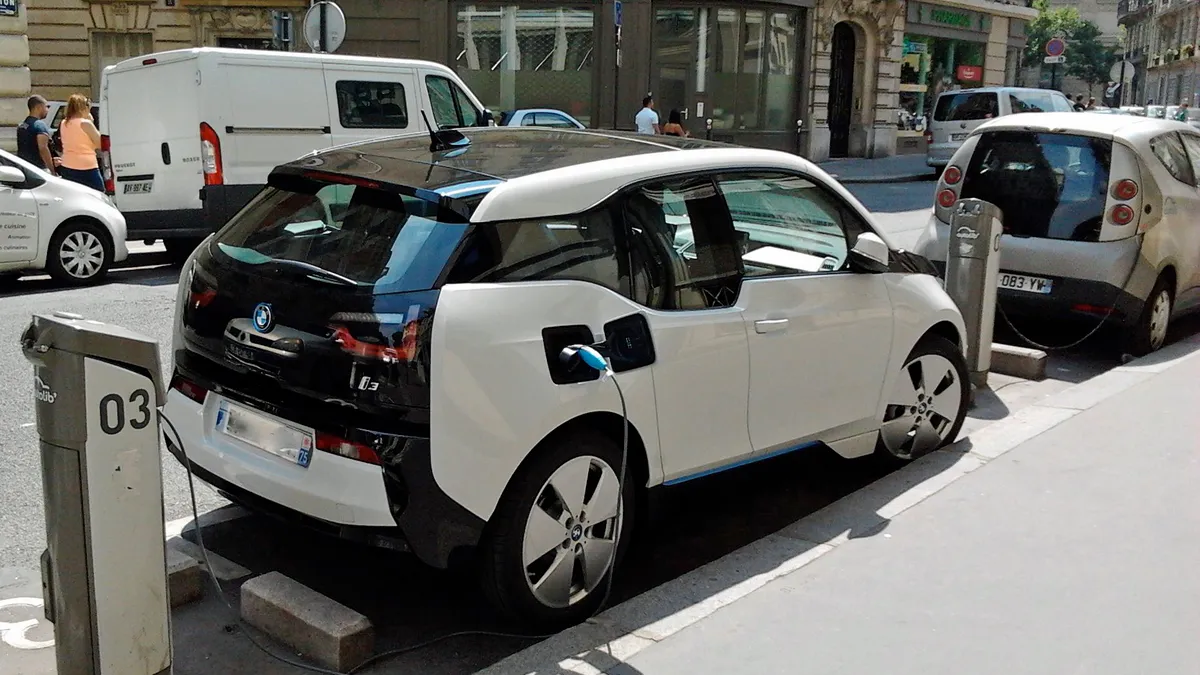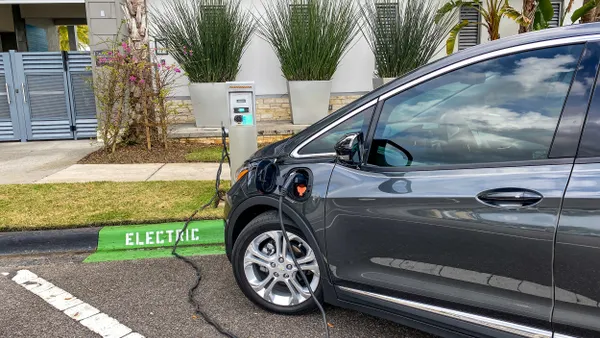Dive Brief:
- New York and California combined on Thursday to authorize almost $1 billion in spending aimed at speeding the rollout of necessary charging stations, marking significant investment into electric vehicle infrastructure.
- The California Public Utilities Commission approved $738 million in transportation electrification projects for the state’s three big investor-owned utilities. New York Democratic Gov. Andrew Cuomo launched EVolve NY, a new $250 million electric vehicle expansion initiative in partnership with the New York Power Authority (NYPA).
- New Jersey utility PSEG also announced plans to spend $300 million on EV infrastructure as part of a multi-billion dollar clean energy and grid investment plan.
Dive Insight:
May 31 was a banner day for supporters of advanced transportation concepts, with implications for home charging, high speed public networks, autonomous driving and fleet infrastructure — led by two states at the forefront of EV planning and adoption.
PSEG's announcement only added to the celebratory mood among EV supporters.
California PUC's decision made waves among observers. It represents the largest investment in charging infrastructure by a state to date, according to Adrian Martinez, a staff attorney at Earthjustice.
California is "living proof of what states can achieve" when they prioritize public health, Martinez said in a statement. The state has "fully embraced a vision of transportation that goes beyond combusting fossil fuels," he added.
The CPUC approved six programs to be rolled out over the next five years:
- San Diego Gas & Electric got approval for a $137 million residential charging program to provide rebates to customers for up to 60,000 Level 2 charging stations at home.
- SDG&E will also offer customers participating in its residential charging program the option to enroll in an EV-only rate, which is not expected to have incremental costs.
- Pacific Gas and Electric Company’s $22 million direct current fast charging make-ready program will install infrastructure at more than 50 sites to support approximately 234 fast charging stations.
- PG&E's $236 million FleetReady Program will install make-ready infrastructure to support at least 6,500 medium- or heavy-duty electric vehicles.
- Southern California Edison got approval for a large infrastructure program, which calls for installing make-ready infrastructure at a minimum of 870 sites, to support the electrification of at least 8,490 medium- or heavy-duty vehicles.
- SCE also expects to establish three new time-of-use rates for commercial EV drivers.
"The only way to get to a largely carbon-free California is by substantially electrifying the state’s vast transportation system," CPUC Commissioner Carla Peterman said in a statement. In addition to project budgets, the commission approved almost $30 million for program evaluation.
According to Larissa Koehler, senior attorney for California Clean Energy, the CPUC's decision included revisions that were "key improvements."
In a statement, Koehler called electrifying all forms of transportation "foundational to fighting climate change." The commission's order preserves an optional dynamic electricity rate for customers who charge their electric cars when clean energy is abundant and helps grid operators more accurately balance supply and demand, Koehler noted.
Across the country, New York Gov. Cuomo said NYPA's EVolve NY aims to "make driving an electric car a viable choice and an affordable option."
NYPA will commit an initial $40 million, and up to $250 million over the next seven years, as well as develop private-sector partnerships to attract investment. Funding will be awarded through the state's competitive procurement process.
The initial $40 million will be allocated to three programs through the end of next year: one aimed at developing interstate fast chargers, another aimed at airport infrastructure, and the third to develop EV model communities that would include a utility-managed charging platform.
The interstate project would identify and install up to 200 fast chargers along key interstate corridors, ideally set every 30 miles.
While electric vehicles have so-far been a tough sell to the public at large, they are widely seen as a key strategy to reducing energy emissions. A 2017 report from the Edison Electric Institute and the Institute for Electric Innovation forecast 7 million on the road by the end of 2025.
In addition to the California and New York announcements, PSEG said Thursday it will spend $300 million to build "smart" electric vehicle infrastructure as part of its plan to invest "$2.9 billion in energy efficiency and other programs that will reduce energy bills and combat climate change."
And Google spinoff Waymo announced it would greatly expand its self-driving fleet, after reaching a deal with Fiat Chrysler Automobiles for more than 60,000 minivans. The Chrysler Pacifica minivans are plug-in hybrids.













